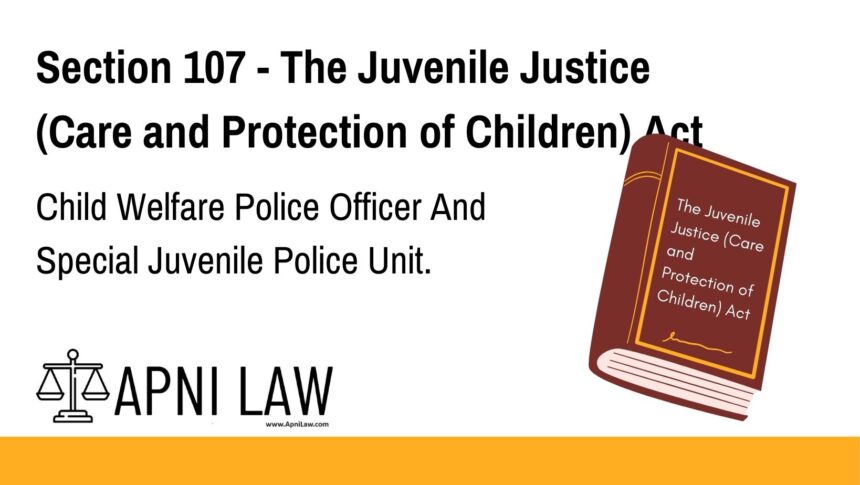Code: Section 107 JJ Act
(1) In every police station, at least one officer, not below the rank of assistant sub-inspector, with aptitude, appropriate training and orientation may be designated as the child welfare police officer to exclusively deal with children either as victims or perpetrators, in co-ordination with the police, voluntary and non-governmental organisations.
(2) To co-ordinate all functions of police related to children, the State Government shall constitute Special Juvenile Police Units in each district and city, headed by a police officer not below the rank of a Deputy Superintendent of Police or above and consisting of all police officers designated under sub-section (1) and two social workers having experience of working in the field of child welfare, of whom one shall be a woman.
(3) All police officers of the Special Juvenile Police Units shall be provided special training, especially at induction as child welfare police officer, to enable them to perform their functions more effectively.
Explanation of Section 107 JJ Act
Section 107 of the Juvenile Justice (Care and Protection of Children) Act, 2015 ensures that children in contact with the law—either as victims or offenders—are treated with appropriate care and sensitivity by the police.
This section mandates:
- Appointment of a specially trained Child Welfare Police Officer (CWPO) at every police station.
- Establishment of Special Juvenile Police Units (SJPUs) in every district and city by the State Government.
- Inclusion of social workers (at least one being a woman) in these units.
- Mandatory specialized training for all officers involved in juvenile care and justice.
These provisions ensure a child-friendly approach to law enforcement and reduce trauma for children involved in criminal or protective proceedings.
Illustration
Example 1: Handling a Child Offender
A 14-year-old child is caught for shoplifting. At the local police station, the designated CWPO, trained in handling such cases, ensures the child is treated with dignity, not kept in a regular lock-up, and is produced before the Juvenile Justice Board.
Example 2: Victim Support
A 12-year-old girl is a victim of abuse. The Special Juvenile Police Unit, which includes a woman social worker, steps in to handle the investigation in a sensitive manner. They ensure she is protected, medically examined, and psychologically counseled.
Common Questions and Answers on Section 107 JJ Act
1. What is the role of a Child Welfare Police Officer?
A CWPO is responsible for handling cases involving children—either as victims or accused. They ensure that children are not treated as adult criminals and that their rights are protected during all police procedures.
2. Who can be appointed as a CWPO?
Any officer not below the rank of Assistant Sub-Inspector with the right aptitude and specialized training in child welfare can be designated as a CWPO.
3. What is a Special Juvenile Police Unit (SJPU)?
An SJPU is a team formed in each district/city by the State Government. It includes trained CWPOs and social workers and is headed by a senior police officer (Deputy Superintendent of Police or above). This unit coordinates all child-related police activities.
4. Is training mandatory for CWPOs and SJPU members?
Yes. Section 107(3) explicitly requires that officers, especially at the time of their induction, be provided special training to effectively handle their roles.
5. Why must one of the social workers in an SJPU be a woman?
To ensure gender-sensitive handling of cases, especially where girl children are involved, and to provide a safe and empathetic environment for female child victims.
Conclusion
Section 107 of the Juvenile Justice (Care and Protection of Children) Act is crucial in reforming how the police interact with children in the legal system. By institutionalizing specially trained officers and inclusive, district-level child protection units, the law ensures a child-friendly approach to justice, aiming to rehabilitate rather than punish.
For more updates and expert insights into Indian criminal and child protection laws, visit 👉 ApniLaw 🚀








